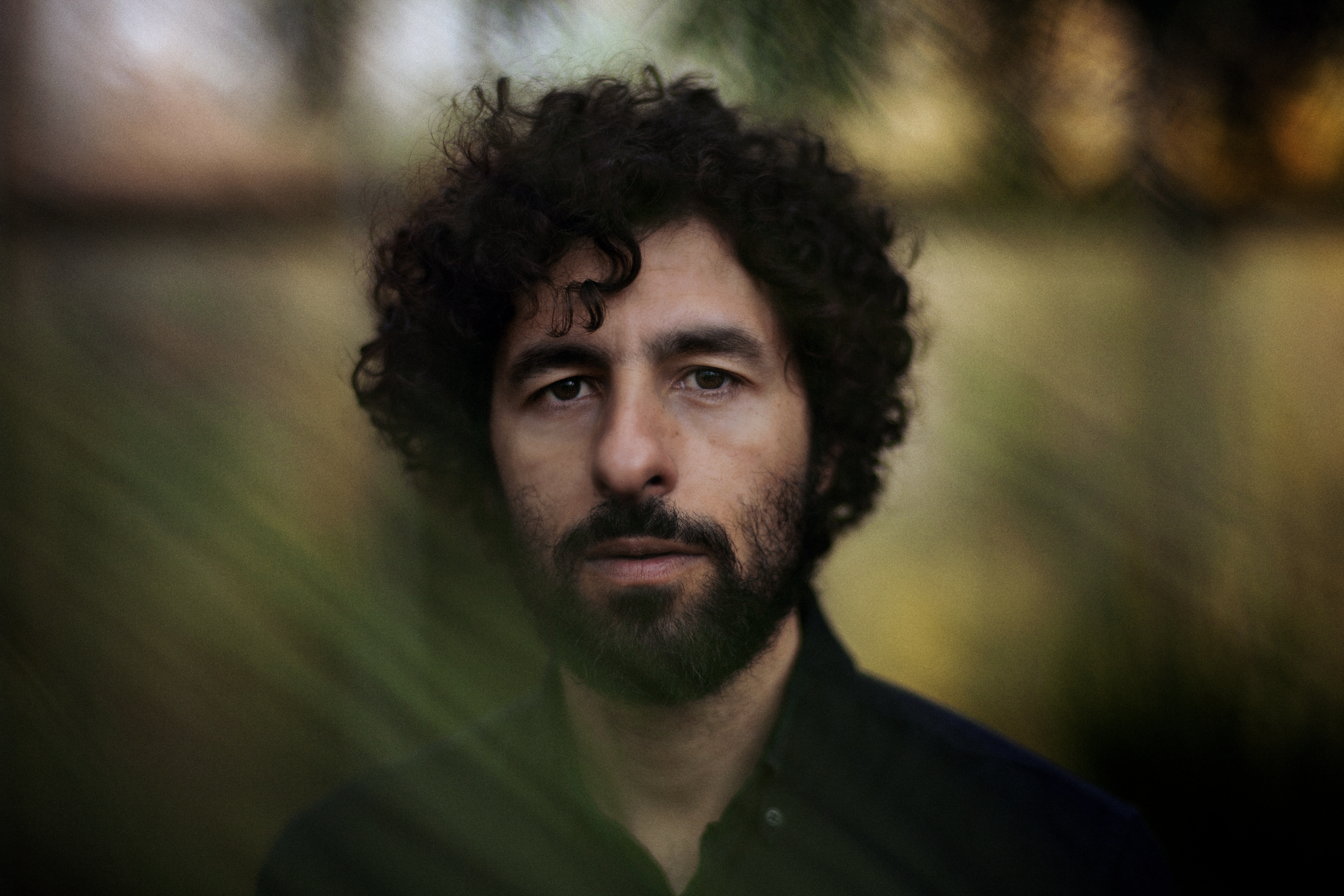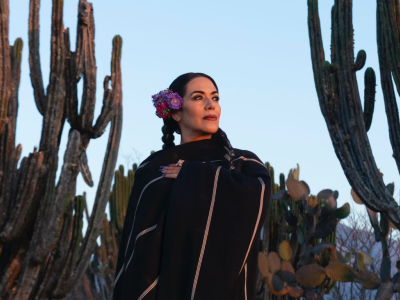The sound of José González is instantly recognisable. Evocative of folk music of a bygone era, with hushed tones and gentle strings he oozes the genius simplicity of a young Art Garfunkel or James Taylor. Emotive and honest, it’s the kind of music that lends itself to Hollywood movies, one with, say, Tom Hank or Ben Stiller (when in a reflective rather than comedic mood). His songs - intimate, meditative and warm - signal to the listener: here is where you feel a deep sense of humanity - life is to be cherished, don’t let it pass you by. They leave you with a feeling that is seemingly meaningful and intensely appealing.
And yet, when the songs from his debut album Veneer catapult this quiet, shy, unassuming song-writer to fame, the Swedish artist with a foreign name retreats into his own world. He’s not ever present in the digital sphere. Neither, for our purposes, is he a Latin artist. In fact, there is little sign in his song style or English lyrics or any mention anywhere, despite the small clue in his name, that José González is Latin American at all.
Then, out of the blue, on his latest album Local Valley, José González records his first song in Spanish. Poignantly, 20 years after the release of Veneer (which he is celebrating with a tour that brings him to the Barbican next month), the style of El Invento is nothing if not distinctly Argentine. Indeed, rather than reminiscent of a bygone era of Western folk, this new sound is distinctly reminiscent of a different bygone era.
Specifically, I defy any Argentine listener of a certain age not to be transported to the early 80s and the distinctive harmonies and spirit of Serú Girán, the iconic Argentine band formed of Charly García and Pedro Aznar.
"It’s probably the most Argentine song never to come out of Argentina," I laugh, after José González appears on my screen, looking ruffled and gentle, like he’s just got out of a wooden Swedish bed.
“Well thank you, I’ll take that as a compliment,” José answers with a wry smile.
He insists, however, that if there is anything Argentine in the song, it was not his intention. Accidental, as (by his own confession) seem to be most things in his life:
“I was basically just doing what I do, but in Spanish. If you listen to my other songs, I would say the guitar and melodies follow classic western folk patterns. So, I guess this is just how I sound in Spanish. For many years I’ve been wanting to write something in my native tongue and finally when I’ve done it, it’s when my fluency in Spanish is not what it was when I was younger, so it feels like a bit of a comeback.”
José also insists he was not listening to Charly García or any prominent figure of rock nacional when he wrote the song, or any time previously.
“I was actually more influenced by Silvio Rodriguez (the famous Cuban cantautor) than I was by rock nacional when I grew up. I never lived in Argentina, I listened to some Mercedes Sosa and Brazilian stuff but not a lot of other Argentine artists.”
However accidental the similarities are, they are too striking to ignore. Me, the cheap psychologist, can't but find it curious that the sound and style of El Invento so resembles that of an idiosyncratic Argentine music era, full of hope but with painful consequences; the same period when José’s story with Argentina ended.
In 1976, his mother and father fled pretty much overnight with their two-year-old daughter – Jose’s older sister – escaping the witch hunt by the military dictatorship that was scouring the country for young left-wing activists. His mother was a Biochemistry student and his dad studied psychology at the University of San Luis.
“Someone tipped them off that they were on the police blacklist. Recently, I saw a copy of a police record and his photo was there on the wanted list. My dad was a member of the Peronist Youth and his friends that told him to get out. They saw what was coming. It was obvious for some what was to come. They basically had to leave over night without telling anyone in case the military came asking questions, even their parents, who didn’t understand how dramatic it was. Later they understood. They crossed the border to Paraguay then to Brazil and in Rio approached the Swedish embassy. And it was only when they arrived in Sweden that they sent back news that they were still alive.”
It’s also curious that El Invento is about the desire for answers, in Jose words: “to the questions — who we are, where we're going and why?”
Dime por dónde vas (Tell me where you’re going) Dime de dónde somos (Tell me where we’re from) Y dime en dónde estamos (And tell me where are we now) Y dime por qué (And tell me why)
These could well be the questions of a young child escaping one country to live in another, even though José says it was his own daughter’s innocent questions that inspired the song. And this is the thing about Jose’s music; you can hear and feel it at the simplest, most innocent level or read into it what you want. It taps into the universal and the particular.
“I try not to sound brainy. I try to make music where you can just listen to the sound,” he insists. “I always want there to be a string of words that work just on an emotional level. I don’t have a noisy sound.”
Did you go back to Argentina? I ask, still curious about this part of his identity.
“I went back for the first time when I was seven, after that we returned once in a while, and obviously I go there touring now…I was in Mendoza not long ago and I met someone who actually didn’t know my dad was still alive and he was super emotional when I told him he was!”
Growing up in Sweden, José says he didn’t really think about any of this or being Latin American. He never felt anything but Swedish. But he recognises that this may have just been due to his own, I’m guessing introvert, personality.
“When I talk to my brother, I realise he had a completely different experience. I don’t remember feeling or being treated differently. But my brother had like a Nazi in his class who wanted to fight him all the time because he was foreign, so his experience was different to mine. He had to fight back.”
In his teens, José discovered a love of science and the world of reason, a passion he still feeds today. He confesses he reads more than he listens to music. And yet, in addition to being an enthusiastic scientist, he happened to possess a naturally enchanting voice, pitch-perfect and with an enviable effortless tone that the most coached singers could only dream of.
“My dad had a good voice, and the only training I’ve had is singing with him, doing harmonies to his favourite Beatles and bossanova songs. I was accepted to a fancy boys choir when I was 10, but they wanted us to buy shoes and expensive clothes even before starting so my parents said no. At 13 I started to play guitar and learnt a lot on my own with dad printing tabs. At 15 I started to play classical guitar with a private teacher once a month for a couple of years. When I was at high-school studying natural sciences a classmate invited me to his choir, and I sang with them for a while.
Unfortunately for science, José also possessed an unusual gift for writing beautiful songs. In a new documentary about him Tiger in Paradise, José talks about the feeling of being in the wrong profession, that he happened to write some songs that were popular and left a career where he may have contributed something ‘more important’ to humanity.
“One of my main problems has been that I have lots of different interests, and my love of music competes with my love of books and hanging out with interesting ideas,” he confesses, alluding to his well-documented ‘problem’ of struggling to write lyrics. “When I used to sing much more about personal stuff, I struggled to the point where I thought about trying to find a lyricist.”
But since reconciling his love of science with music, he claims lyrics have become easier to write.
“Recently science and music have come together in my life more than ever. The songs on Local Valley are much more to do with the world of ideas. Visions is about utopias, and how to move forward as humanity whilst navigating these hyper-technological times. Those themes are inspired by scientists, philosophers and frameworks of thinking that I have now that I didn’t have before. This way its working better than ever. I know what puzzles I need to complete to write a song. And if I need to speed it up,” he laughs. “I just ask the bot to write a José González song, to help me along.”
The unusual combination of soothing melodies and philosophy reminds me of another scientist-turned-songwriter, Jorge Drexler, who was a doctor until he became a full-time musician. Like Drexler, whose Oscar-winning tune also catapulted him into the global spotlight, González has had to navigate the pressure to constantly ‘maintain your profile’ that so encumber artists these days. But as with writing lyrics, it was only time that could help resolve the difficulty of writing in Spanish. After having children things clicked.
“With my third solo album I tried to write in Spanish, and I gave up. This time it worked. Spanish speaking with my daughter, I got more relaxed about it, being goofy with her in Spanish helped,” he says, referring to the unconscious memory of how we were talked to as children kicks in when we have our own. But in terms of his identity, it’s clear José still doesn’t quite know where he belongs.
“I love going to Argentina, I look Argentine and have an Argentine accent, and the media there get very excited about this. I guess they see in you what they want to see,” he says before betraying a slight nervousness. “It’s going to be interesting with the movie (Tiger in Paradise), because it’s very critical of religion and dogmatism in general. The Swedes are very secular and I’m not sure how they are going to receive my ideas in South America or Argentine. I guess making a film about religion is one way to polarise an audience and make sure no one comes to your shows!”
Argentina is not that religious, I suggest, not as much as other neighbouring countries like Chile.
“Well maybe, but if you think about abortion, they only recently allowed it. And I have an issue with patriarchal society and its view of women generally. For me, my view of the world through secular humanism is very linked to feminism and if I want to find anger to fuel my writing there are many examples of dogmatic thinking which are just wrong in terms of impacting on individual freedom and to me it’s obvious that some are on the right side of history and some are on the wrong side.”
Some might say that in itself is a dogmatic view, I think, or perhaps the clarity of science beckons. Interestingly, the issue of dogmatism and discussion is addressed in José’s only other song in Spanish, Valle Locale, a beautiful melody but now with West African guitar influences and not Argentine-sounding at all.
In Local Valley, the album, José González’s journey of exploration into diverse worlds of music and ideas simultaneously takes flight. It is a rich tapestry of global influences to highlight humanity’s struggles in the face of universal challenges. The free spirit and the scientist co-exist and try and work it out, a tussle the listener would not guess bathing in González’s meditative magic. Nevertheless, something in the sound betrays an artist that is probably not so sure about himself and the way things should be. That is precisely the charm.
José Gonzalez will play at the Barbican on Fri 9 and Sat 10 June https://www.barbican.org.uk/whats-on/2023/event/jose-gonzalez-veneer-20…
















